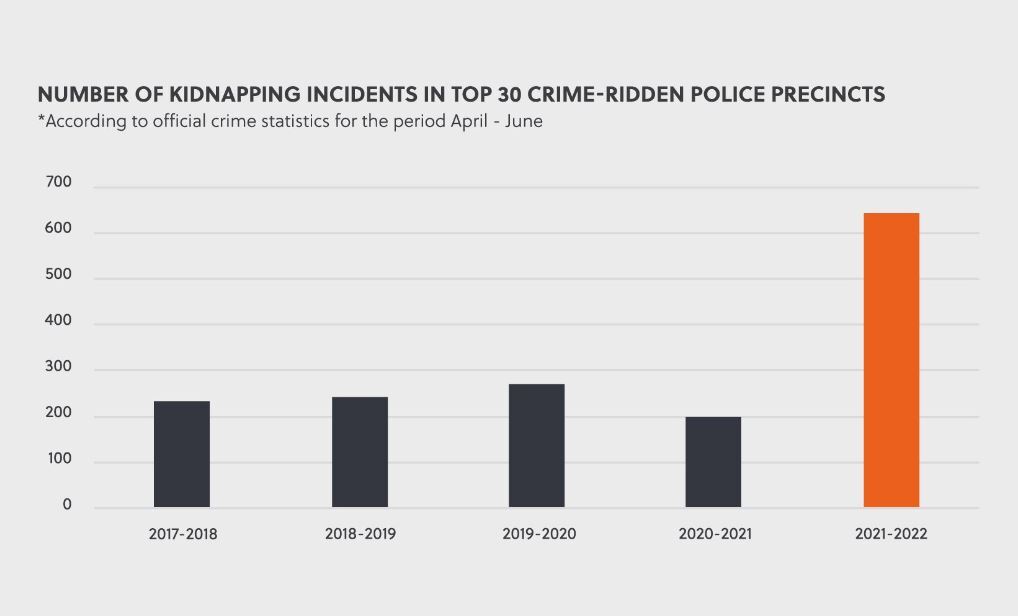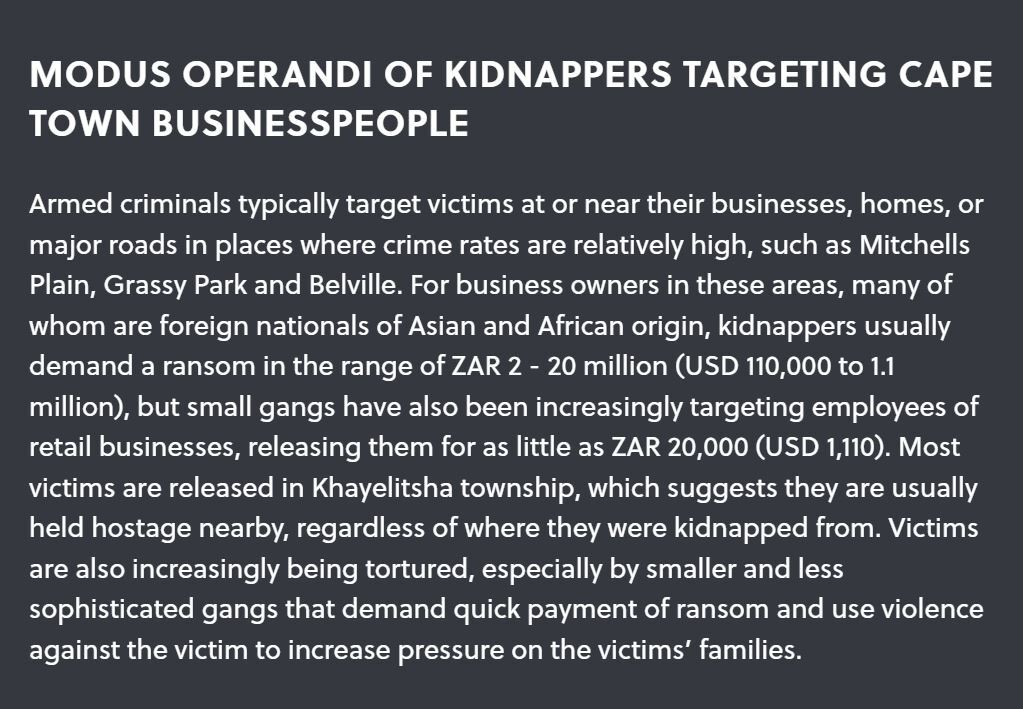On the rise: Kidnap for ransom in South Africa
In late August, when several men in police uniform set up a roadblock to stop the vehicle of 37-year-old Bangladeshi businessman Akter Pradhan on a highway in Cape Town, kidnapping was probably the last thing on Pradhan’s mind. Yet, as the widely circulated video of the incident recorded by a bystander shows the kidnappers - pretending to be traffic officials - forcing Pradhan into their vehicle in broad daylight before driving away. For the next two weeks, the assailants tortured Pradhan, demanding a ransom of more than USD one million, while posting videos of his poor treatment on Pradhan’s personal Whatsapp and Facebook accounts. The eventual release of Pradhan, likely after the payment of a reduced ransom amount, did little to reassure other businesspersons, as on 9 September, Cape Town businessman Khalid Parker was shot and killed in what appeared to be a failed kidnapping attempt near his home in Lansdowne. Although police arrested some suspects shortly afterwards, the swift response has done little address the key drivers of this worsening problem.
THE RISE IN KIDNAP FOR RANSOM CASES
Historically, kidnap for ransom and extortion make up a minority of overall kidnapping cases in South Africa. According to police statistics, of the 3,024 total abductions recorded in 2019/20, only 77 and 65 cases were linked to ransom and extortion, respectively, with the rest pertaining to armed robbery, sexual exploitation, and other crimes. However, there has been a significant increase in almost all types of kidnapping over the past two years, including kidnap for ransom. Between January to March 2022 alone, there were 3,306 kidnaping incidents recorded countrywide, which is an increase of more than 1,580 cases compared to the same period last year. At least 78 of these cases were linked to ransom, although the actual number of ransom cases is believed to be higher with some cases likely unreported to authorities.
Kidnap for ransom incidents in South Africa first attracted national attention around 2016-2018, when several wealthy businesspeople – mainly from Asia or of Asian origin primarily operating in the retail sector – were targeted. The perpetrators were well-organised syndicates with reported links to Mozambique, Pakistan, and Bangladesh. Despite a near hiatus in the early months of the pandemic, by late 2020, as Covid-19 restrictions eased across South Africa, kidnap for ransom incidents started rising. Today, retail businesspeople and their staff (and in some cases their family members) are being kidnapped almost weekly, especially in Cape Town and Johannesburg, although not all cases are reported in the media or specifically include a ransom demand.


WHAT EXPLAINS THE SURGE IN INCIDENTS?
There are multiple factors behind the surge in incidents. The pandemic exacerbated South Africa’s existing socio-economic challenges, which has coincided with a rise in most types of crime since restrictions eased, including kidnap for ransom. Furthermore, while major syndicates connected to the 2016 gangs continue to operate, many copycat gangs have since emerged. These gangs have been motivated by the tendency of the families of the victims to pay ransom. And, although police authorities publicly discourage the payment of ransom, they are more likely to approve ransm payments in private, usually under pressure to resolve a high number of cases and due to concerns relating to the victims’ health and safety.
Not only has South Africa experienced an increase in cases, but the perpetrators’ targeting pattern has also shifted. Retail businesses such as supermarkets and grocery stores have been historically targeted by armed robbers, who are typically after cash, cigarettes, and other lootable products. These crimes prompted many business owners to reduce the amount of cash and other goods available in their stores. Yet, while this has partially reduced the frequency of armed robberies it has in turn increased the threat of kidnap for ransom faced by these business figures.
Inconsistent police response is another source of concern. While there have been some cases of corrupt police officers colluding with kidnappers, this does not appear to be an endemic problem. Rather, security experts are near unanimous in their assessment that the South African Police Service’s (SAPS) primary weakness is under-resourcing. The lack of an adequate number of kidnapping-focused detectives, advanced tracking technology and intelligence capabilities are among some of the primary resource gaps within the SAPS. A number of foreign businesspeople, especially those of Asian and African origin, are also of the belief that there is little political will among the security forces to tackle crimes against them, as opposed to high profile cases involving South African kidnap victims. Although the SAPS has been instrumental in securing the release of several foreign victims, there are growing frustrations among affected communities over what has been described as an inadequate government and police response.
OUTLOOK
The combination of an overburdened and under-resourced police force, victims’ families’ willingness to pay ransom, and foreign nationals being particularly vulnerable, create a permissive environment for sophisticated and opportunistic kidnappers. Until the authorities manage to address some of the underlying factors, kidnappings will likely continue to increase over the coming months. At a recent anti-kidnapping townhall meeting in Cape Town, Imraahn Mukaddam, a prominent public safety activist, sent a more ominous warning, saying if the government and other stakeholders do not get a grip over the situation, “South Africa could become a new capital of kidnapping… in two to three years.”
"THE LACK OF ADEQUATE NUMBER OF KIDNAPPING-FOCUSED DETECTIVES, ADVANCED TRACKING TECHNOLOGY AND INTELLIGENCE CAPABILITIES ARE AMONG SOME OF THE PRIMARY RESOURCE GAPS WITHIN THE SOUTH AFRICAN POLICE SERVICE (SAPS)."
